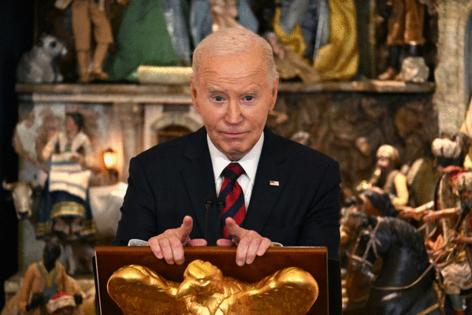Editorial: Presidential pardons done right: Unlike Hunter pardon, Biden's clemency grants are just
Published in Op Eds
As President Joe Biden heads to the end of his time in the Oval Office, he is leaving with an act of compassion for those serving unnecessarily long federal prison sentences and who have perhaps been targeted by punitive laws that no longer fit in with our contemporary understandings of fairness and proportionality.
These grants of clemency were done the right way, through the Department of Justice Office of the Pardon Attorney under regular procedures, unlike how he broke his word and conferred on his legitimately convicted (but not sentenced) son Hunter “ a full and unconditional pardon.”
Last week, the president commuted the sentences of almost 1,500 nonviolent offenders who have already been serving sentences at home under the CARES Act. In addition, 39 people were pardoned, allowing them to continue their lives outside the shadow of a federal criminal conviction. This comes after Biden has already used these powers for justice, issuing blanket pardons for people convicted of minor marijuana offenses and for service members convicted for their sexual orientations.
As the White House notes, many of the sentences commuted would have been initially lower if they had been handed down today. Plus, a chunk of these pardons have been for crimes that no longer exist in their current form, or that we don’t consider very serious.
In some important ways, the commutations are a recognition that some laws and sentencing guidelines were disproportionate and contrary to what should be the ultimate goal of criminal lockup: to issue some punishment, yes, but also to be dissuasive and to at least allow for the prospect of people returning to their lives with the ability and resolve to live better lives. Decades-long sentences for relatively minor and nonviolent offenses does not fulfill this goal, and does not ultimately keep anyone safer.
Except for the nonviolent aspect, the Hunter pardon does not fit the standard of last week's acts of executive clemency. It was issued prematurely before Hunter had been sentenced and had a chance to appeal his conviction and punishment through the court system. It also was a direct contravention of the president’s promise to respect the ruling of the jury. It seems a family Thanksgiving on Nantucket mattered more than all that high-minded stuff.
As it stood, the Hunter pardon hurt Biden’s legacy by being so self-interested and personal and it fed conspiracy theories of partisan federal prosecutions, which undermines the idea of equal justice under law.
One additional thing that the president might consider in his waning weeks at the helm is the commutation of some death row sentences to life imprisonment. At the end of his tenure, Donald Trump oversaw 13 executions, the only type of punishment that cannot be in any way reversed or patched up if laws change or mistakes are discovered during the criminal justice process. There have been situations where we have felt that capital punishment is warranted, but not every case is as cut and dried.
Trump, meanwhile, is already planning on using his pardon power on day one to pardon the Jan. 6 rioters, who attempted to overthrow democracy. With his act of mercy, Biden sets a better parting example.
___
©2024 New York Daily News. Visit at nydailynews.com. Distributed by Tribune Content Agency, LLC.




























































Comments